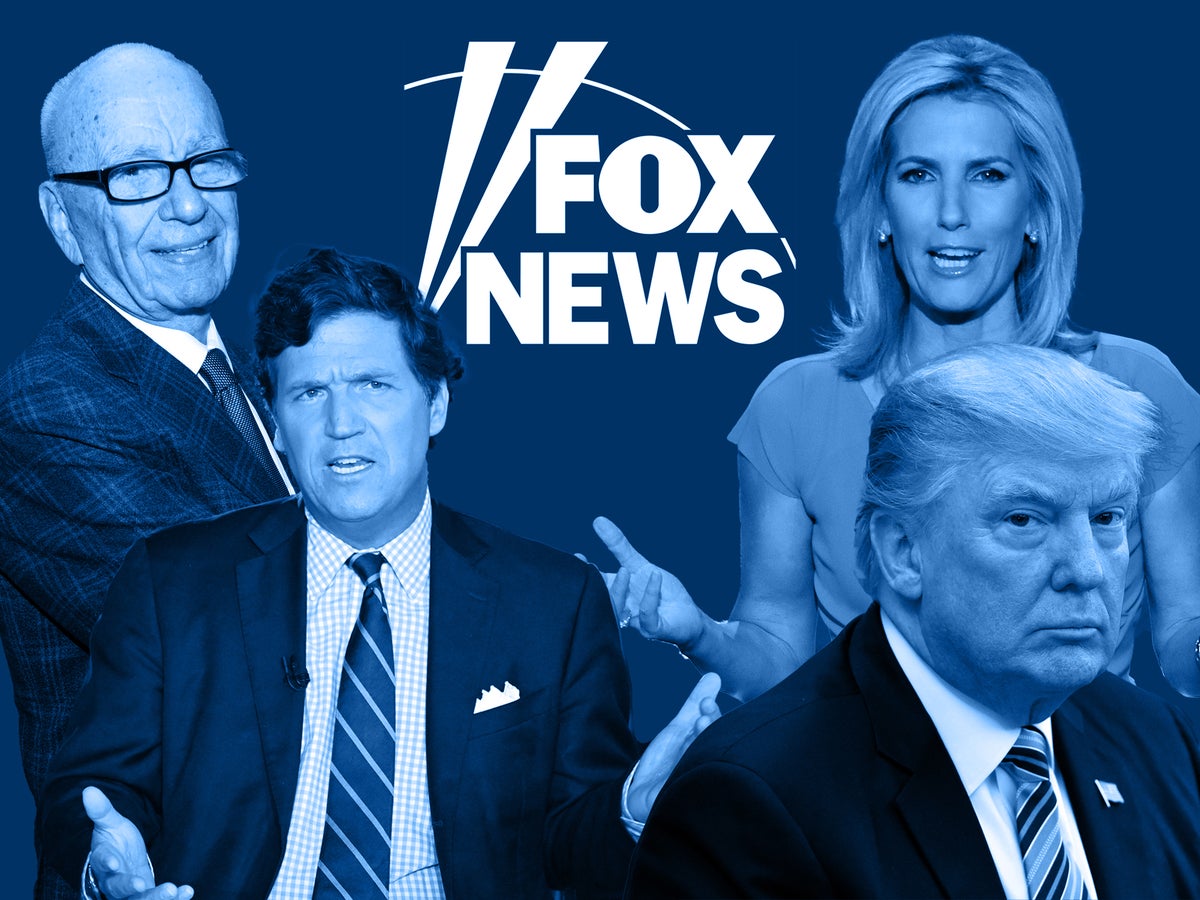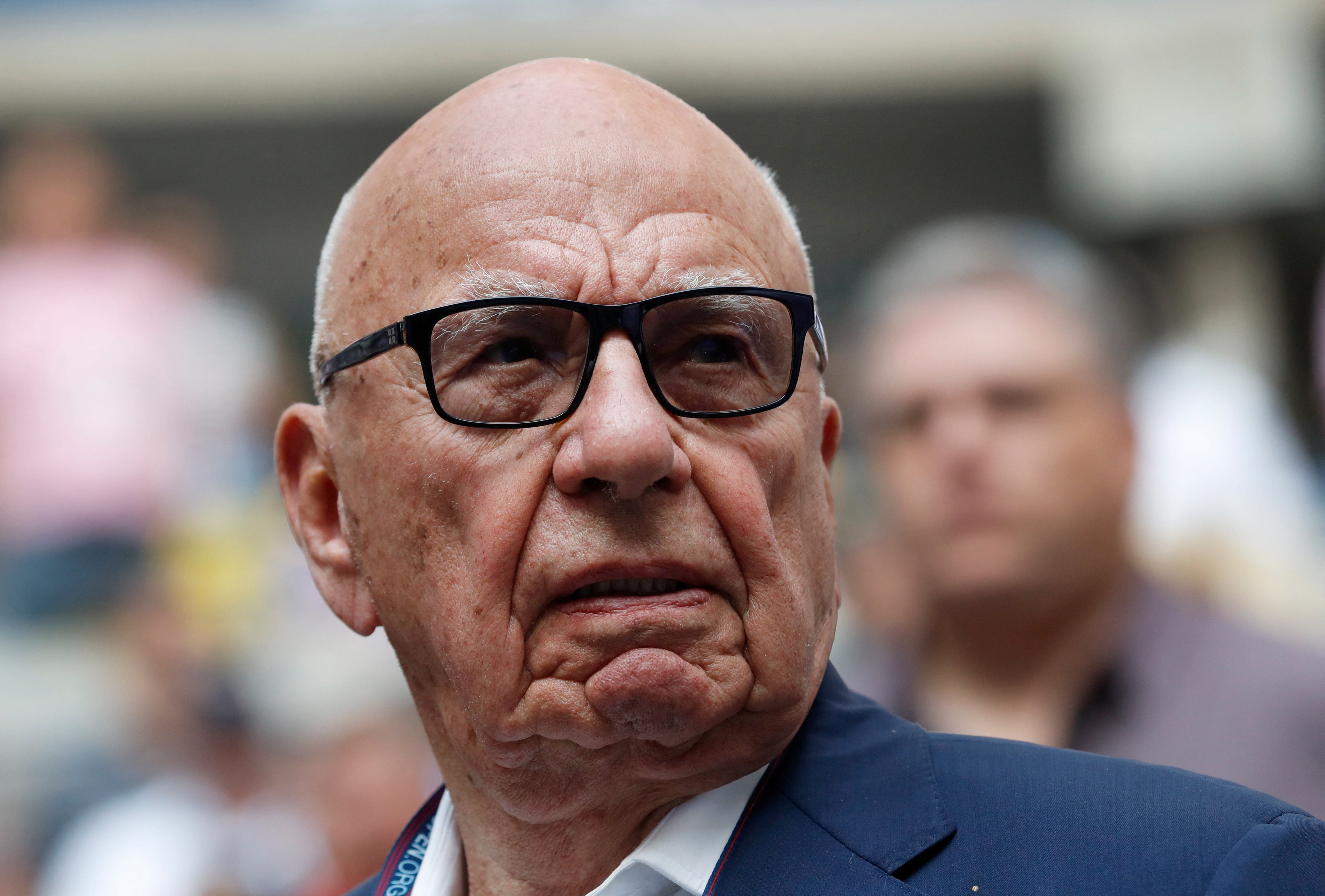
Private communications made public in a defamation lawsuit against Fox News revealed some of the network’s top stars and executives acknowledging baseless conspiracy theories surrounding the 2020 presidential election.
The $1.6bn lawsuit from Dominion Voting Systems, the company at the centre of bogus on-air statements from Donald Trump’s allies, argues that the right-wing media network knowingly presented false claims that energised competing networks that threatened Fox viewership.
Private admissions detailed in court filings show text messages, emails and sworn testimony questioning or ridiculing unreliable guests and spurious arguments while at the same time conceding that publicly rejecting those claims would risk alienating their viewers.
Embarrassing and potentially reputation-damaging behind-the-scenes revelations, stitched together in Dominion’s sprawling case alleging a media empire that relies on lying to its audience, may be compelling evidence, but they are not necessarily enough to reach the high bar in a billion-dollar defamation case, according to legal analysts.
Those findings will be enormously helpful for a jury to consider Dominion’s case if a trial begins as scheduled in April. But prevailing in court means Dominion must prove that Fox aired defamatory statements knowing that they were false or with reckless disregard for the truth, and link those accusations to the states of mind of those responsible for airing them.
Those hurdles are outlined in the US Supreme Court precedent established in The New York Times v Sullivan, a landmark press freedom case from 1964 that has also been at the centre of right-wing attacks on the media, including recent lawsuits from Sarah Palin and Donald Trump.
Some analysts argue that Dominion’s case against the most-watched cable media outlet could deliver a blow to press freedom protections while, ironically, powerful right-wing figures launch their own legal challenges to strip the Sullivan precedent entirely.
A spokesperson for Fox News told The Independent that Dominion joins a “long line of public figures and corporations across the country that have long tried to silence the press, and this lawsuit from Staple Street Capital-owned Dominion is nothing more than another flagrant attack on the First Amendment.”
“Fox News will continue to fiercely protect the free press as a ruling in favor of Dominion would have grave consequences for journalism across this country,” the statement said.
In another twist of fate, Dominion’s case literally involves the levers of democracy, “things that we should be very wary about punishing,” according to Andrew Geronimo, director of the First Amendment Clinic within the Milton and Charlotte Kramer Law Clinic at Case Western Reserve University School of Law.
“We want to encourage a robust and wide-open discussion about public affairs, especially about how to run our governments, and we want to allow for some breathing room … to let people talk about this without having to do the full journalistic run at it,” he told The Independent.
“But what you can’t do is knowingly lie about somebody in a way that damages them,” he said.
The ‘big media’ story driving Dominion’s case against Fox
Dominion submitted dozens of pages outlining the considerations needed to meet the “actual malice” standard, including statements and messages from the network’s on-air personalities, producers and executive leadership, as well as Fox Corporation chairman Rupert Murdoch’s admission in a sworn deposition that some of his stars were “endorsing” a false narrative around the 2020 election.
Attorneys for Fox News argue that Dominion has sought to distract from its “evidentiary deficiencies” by “cherrypicking anything it can find from any corner of the Fox News organisation that shows that anyone at Fox News doubted or disbelieved the president’s allegations.”
“From there, it posits that ‘Fox’ writ large – not the specific person(s) at Fox News responsible for each statement – ‘knew’ that that specific statement was false,” according to court filings from Fox News.
In addition to uncovered messages and admissions in sworn testimony, Dominion’s case has relied on showing a much-larger picture of the Fox organisation, its decision making, and its concerns over declining viewership with competition from other right-wing networks that have indulged the former president’s conspiracy theories.
That is the “media story” narrative driving Dominion’s case, “so you don’t get the plausible deniability of ‘we’re just putting newsworthy stuff on air,’ which is the argument [Fox] is making,” Mr Geronimo said.
In legal briefs, attorneys for Fox News have argued that news organisations have an obligation to air newsworthy allegations, especially those from a sitting president. But those claims are likely to dissolve if the network was driven by profit rather than facts, according to legal analysts.
“The fact that there was arguably a motive by Fox to publish these accusations against Dominion based on its own economic interests in retaining Trump viewers would, if believed by the jury, probably destroy that argument,” Rutgers University law professor Ronald Chen told NPR.
Why haven’t Dominion and Fox reached a settlement?
Attorneys for Fox News have argued that Dominion was not damaged anywhere close to the $1.6bn the voting machine company is seeking.
But if there are boards of elections around the country “canceling contracts with Dominion and citing some of this reporting that turns out to be false, I think that is a way to show damages,” Mr Geronimo said.
“I think what a trial really should do in this case is go through statement by statement, and figure which of them are statements of fact, and if they are statements of fact, which of them are false,” he told The Independent. “And if they’re false, which of them damaged Dominion? … I think there should be a pretty granular and specific analysis of what was said, who knew what and when, and only if all those boxes are checked should there be some kind of liability.”
Richard Tofel, former president of nonprofit investigative news publisher ProPublica, argued that the parties should settle. For Dominion, that means reaching a conclusion long before a potentially lengthy trial, conviction and sentencing that could take months or years to enforce.
“Dominion has proved the hardest part of its case, that Fox not only repeatedly broadcast untruths in the days and weeks after the election, but that it did so knowingly, and for the base motive of pandering to viewers, especially as some defected to rival networks, and thus preserving profits,” he wrote.
Fox, on the other hand, could settle to avoid a potentially even-larger trial verdict amount, and, perhaps more importantly to its business, the network would avoid having to publicly and repeatedly admit a series of truths that, as court filings have revealed, could damage the business and crash viewership.
A settlement scenario would not necessarily be an admission of guilt but could include an agreement that Fox News agrees “to say those things we got sued over,” he said.
“I don’t think a settlement would change how Fox does business really in any way,” he told The Independent. “This whole incident … might make them a little bit more cautious.”

Tim Heaphy, a former federal prosecutor and the lead investigator for the House select committee investigating January 6, said that the legal system in this case reveals its function as “a forum in which people can address grievances and get justice, and there is an important sort of public discourse benefit, because a lot of that plays out in a public way.”
He suggested that Dominion may not want to settle exactly for that reason.
“They want a lot of these facts to be laid bare in a courtroom in a public proceeding,” he told MSNBC. “We’re headed there. There may be more of these kinds of behind-the-scenes allegations, and I do think that there’s a useful long-term benefit for people to understand.”
Will a victory for Dominion be a ‘slippery slope’ for the First Amendment?
A victory for Dominion at a trial could be a devastating blow to Fox. Longtime First Amendment attorney Lee Levine told The Los Angeles Times: “I have a hard time envisioning a scenario in which Fox wins before a jury.”
But some legal analysts fear that elevated scrutiny into a media outlet on the hook for hundreds of millions of dollars in damages – or more, if a jury decides – could cause long-term harm to US newsrooms.
“Generally speaking, it is not a good idea to permit a wholesale inquiry into newsroom decisions as a whole, and also I include ownership as part of that inquiry,” according to James Goodale, the New York Times general counsel who advised the paper to publish the Pentagon Papers, speaking to NPR.
“No matter how much I might personally deplore what Fox is alleged to have done, I worry a lot more about the longer term-ramifications,” according to Jane Kirtley, University of Minnesota media law professor and a former executive director of the Reporters Committee for Freedom of the Press, speaking to NPR.
“To simply say Fox is a bunch of liars – that they shouldn’t be allowed to get away with this and their wild speculations should not be reported and should not be protected – I just think that that is a slippery slope,” she told the outlet.
“But the problem is that by lifting the veil on the editorial decision-making process, we are now going to see all news organizations called into question going forward,” she added.
Fox has argued similarly in statements to the press; a spokesperson told The Independent that the case presents “an unprecedented assault on the First Amendment”.
But “even if Dominion makes their case and convinces a jury to shovel truckloads of Fox’s money to [Dominion], nothing in this case presents a meaningful threat to the First Amendment,” according to former Bloomberg counsel and New York University professor Charles Glasser, speaking to NPR.
“It really comes down to the facts about how the story was crafted and disseminated,” he added.
Mr Geronimo told The Independent that a jury, in the end, “might just not like you.”
“And if they don’t like you, then they might be inclined to fight against you,” he said.
“I don’t think we want people just picking sides and apportioning liability there, because then what, when the sides are flipped?” he added. “That’s a dynamic that I will be watching if it goes to trial: Are they doing what I think the analysis requires, which is finding specific statements, and checking off the elements? Or is it all just like, ‘Look how bad Fox was’? … and not be as specific with which statement was a false statement of fact.”







